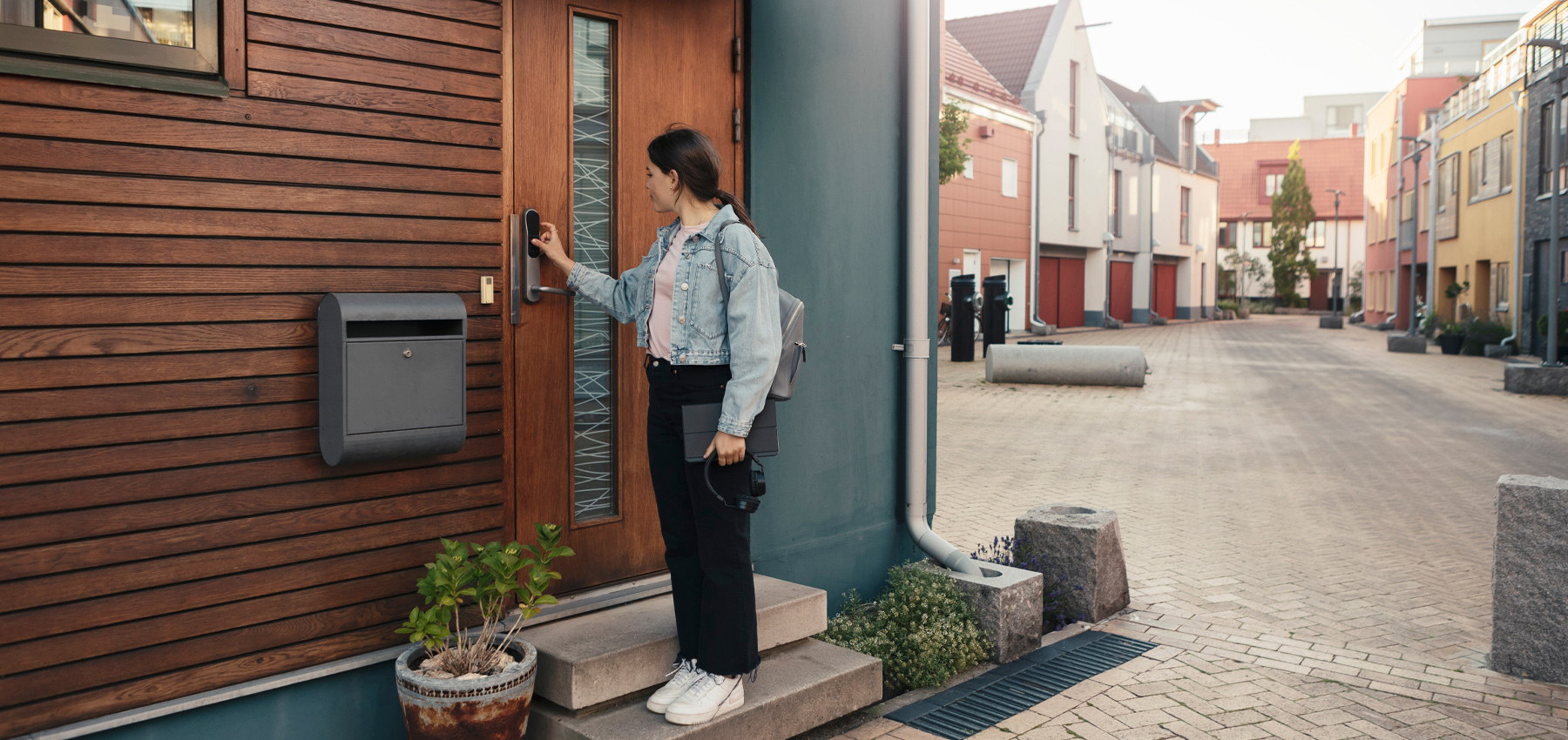As a newcomer, the first step to settling down in Canada is finding long-term accommodation. However, renting your first home in Canada comes with several challenges. Since rents are fairly high in most Canadian cities, affordability may be an issue until you find a suitable job. In addition, most landlords favour tenants who’ve been in Canada longer and have an established credit history or employment record.
Renting a basement apartment generally comes with fewer requirements and a lower cost, making it a preferred accommodation option for many newcomers to Canada. In this article, we’ll walk you through the types of basement units you can find, the pros and cons of living in a basement apartment, and tips on renting a basement apartment in Canada as a newcomer.
In this article:
- What is a basement apartment?
- Types of basement apartments in Canada
- Benefits of renting a basement apartment in Canada
- Disadvantages of renting a basement apartment in Canada
- Tips on renting a basement apartment as a newcomer to Canada
- How to find basement apartments for rent in Canada?
- Should you rent a basement apartment as a newcomer to Canada?
Download our guide on finding accommodation in Canada for insights on renting versus buying, as well as tips on how to find the right home, and buying or renting a house as a newcomer. |
What is a basement apartment?
A basement apartment is a lower, mostly-below-ground, floor of a detached or semi-detached home or townhouse that has been set up to function as an independent living space. Basement apartments typically have one or more bathrooms, rooms, and kitchens that are separate from the main unit of the house. They often have small windows that provide limited sunlight to the unit.
In Canada, homeowners sometimes rent out their basement apartments as separate long- or short-term accommodation units. In such cases, the main level(s) of the home may be occupied by the homeowner or be rented out to a separate family.
As a newcomer, it’s easy to imagine basement apartments as dark, windowless spaces, but that’s usually not the case. Provincial regulations and city bylaws typically require basements to meet certain minimum standards to qualify as legal basement apartments. These standards include rules around the number of exits, window size, the minimum ceiling height, unit size, access to utilities, and compliance with fire safety and electrical safety regulations.
| Not sure a basement apartment is right for you? Read our article on types of housing in Canada to explore other accommodation options in your new city. |
Types of basement apartments in Canada
Based on how and where their exits open, there are two main types of basement apartments in Canada:
Completely or partially underground basements
This is the most common type of basement apartment in Canada. Basements that are completely or partially underground have stairs that lead to a private exit or a shared exit through the main level of the house.
Most basement apartments have small windows close to the ceiling in the bedrooms and living rooms, but depending on the city you’re in and the laws that apply to secondary dwelling units, the number and size of windows may vary. In Ontario, for instance, underground basements must legally have at least two exits, which can include a door and a window that’s big enough to crawl out of in case of a fire.
Basement apartments that are roughly the same size as the house above are called full basements, while partial basements are smaller than the main level of the house.
Walkout basements
Walkout basements, as the name suggests, are basement apartments you can walk out of. These apartments are partially underground with one or more full-sized windows and a separate exit that opens directly on the ground level to the street or backyard. In some parts of Canada, basement apartments with a few stairs leading up to the ground level are also called walkout basements.
Benefits of renting a basement apartment in Canada
The idea of living in a basement may seem unappealing at first, given the limited natural light they receive, but the advantages of renting a basement apartment often outweigh the demerits. Here are some aspects that make basement apartments a great accommodation option for newcomers.
Fewer rental application requirements
Renting accommodation as a newcomer to Canada isn’t easy. Most rental applications require you to have an established Canadian credit history or job letter, but since it takes newcomers time to get these, you may not qualify right away for many of the rental options you come across.
Individual homeowners are likely to be more flexible with rental application requirements compared to corporate landlords of apartment buildings. Homeowners may be willing to make exceptions on a case-to-case basis, making it easier for newcomers to rent basement apartments.
| Learn more: Read our article on renting accommodation with no credit history or job letter in Canada for tips and workarounds for common rental requirements that newcomers don’t meet. |
Lower rental prices
Many newcomers are on a tight budget when they first arrive in Canada. In the beginning, renting accommodation will typically be your biggest expense, taking up as much as 30 to 60 per cent of your monthly budget.
You can significantly lower your monthly expenses by renting a basement apartment since this type of accommodation is usually cheaper than other rental options in Canada. For instance, the average monthly rent for a one-bedroom apartment or condo in Toronto is $2,044 CAD while the average rent for a one-bedroom basement apartment is $1,500 CAD (figures reflect rental prices as of March 2022).
Similarly, you can rent a two-bedroom basement in Toronto for around $1,920 CAD per month, roughly 30 per cent less than the average rent for a two-bedroom apartment or condo in the city.
Rent usually includes utilities
The cost of utilities, such as electricity (hydro), water, wi-fi, heating and air conditioning, is often included when you rent a basement apartment in Canada. Since some utility bills are shared with the main house, some landlords may ask you to pay a percentage of the utility bills or a fixed monthly amount in addition to your rent.
In some cases, homeowners may fully or partially furnish the basement apartment before renting it out. Such accommodation options can save you a significant sum of money you’d otherwise spend on furniture and appliances.
More space on a smaller budget
If you’re looking for a spacious first home or moving to Canada with your family, basement apartments may be a good choice. Full basements are almost as big as the home built above them and are much larger than apartments or condos you’ll get for the same price.
In Toronto, the average rent for a two-bedroom basement is lower than the average monthly cost for a one-bedroom condo. Plus, the rooms in a basement apartment will likely be more spacious.
Live in a better neighbourhood on a smaller budget
By renting a basement apartment, you may be able to afford to live in an otherwise more expensive and residential neighbourhood that’s not too densely populated. There are many factors you should consider when choosing a neighbourhood, including access to public transit and amenities, walk scores, distance from the city centre, and the cultural mix of residents.
Picking a family-friendly neighbourhood will be even more important if you have children and are looking for a good school district or proximity to parks or playgrounds.
Disadvantages of renting a basement apartment in Canada
Although many newcomers prefer basement apartments, this type of accommodation may not be the right fit for everyone. Renting a basement may have some inherent disadvantages, owing to its structure and positioning.
Limited natural light
Since basement apartments are completely or partially below ground level, with small windows, these units may not get enough sunlight. If hydro isn’t included in your rent, be prepared for higher than usual bills since you’ll likely need artificial light fixtures in every room. Basement units can sometimes get dark and gloomy, especially during the winter months and, in extreme cases, the lack of natural light can negatively affect your sleep patterns and mental health.
Privacy concerns and noise
Living in the same building as your landlord or other tenants isn’t always ideal. If the homeowner is intrusive or subjects tenants to burdensome restrictions, this may interfere with your way of life. Some basement apartments have a shared exit that opens into the main house, which can make it difficult to avoid running into your landlord or co-occupants on a daily basis. Having a private exit can alleviate some of these privacy concerns.
Basement apartments can also get quite noisy, especially if small children live in the main unit or if the house is located close to the street. Noise can be especially problematic if you plan to work from home or have virtual job interviews scheduled.
Basements tend to be colder than the main house
Being below-ground with limited exposure to direct sunlight, basement apartments can become quite cold during the winter. Often, the thermostat is on the main level of the house, and you may not be able to control the temperature in your basement separately, or you may need an additional space heater. On the flip side, basement apartments also tend to be cooler and more comfortable during the summer months.
Higher risk of flooding
Basement apartments have a higher risk of flooding compared to above-ground units. During rainy months, rainwater or overflow from storm drains can sometimes seep into the apartment and damage property. Faulty drainage systems or burst water pipes in the main building can also flood basements.
During the winter months, if the entrance to the basement is not covered, be prepared to shovel snow to avoid it blocking the exit.
Lack of access to shared amenities
Unlike in a condo or apartment building, you won’t have access to shared amenities like a gym and swimming pool if you rent a basement apartment. However, many neighbourhoods have community centres where you can access facilities such as swimming pools, gyms, ice skating rinks, tennis courts, dance studios, and more for free or a small fee.
If the house has a backyard or garden, the landlord may or may not allow you to access it. Be sure to confirm this before you sign the lease.
Tips for renting a basement apartment as a newcomer to Canada
It’s not always possible to judge an apartment by looking at pictures alone. If you plan to rent a basement apartment in Canada, it’s important you carefully inspect the unit in person before signing a lease agreement. Here are some things to check before you rent a basement apartment.
- Is it a legal basement? As a newcomer, you should keep in mind that some basement apartments you find online may not be legal. Often, illegal basements are listed for lower than the current market rents, but renting such units can be risky. Various provinces and municipalities have different rules for legal basements, many of which concern safety and comfort. For instance, in Toronto, a legal basement apartment must comply with fire code standards, building codes, municipal bylaws, as well as electrical safety regulations. To qualify as a legal, independent unit, a basement apartment must also have access to cold and hot water, heating and cooling, electricity, sinks, and laundry facilities (separate or shared).
- Does it have sufficient lighting? While basement apartments tend to get less natural light than above-ground units, some basements may be brighter than others. Make sure that the basement has at least a few reasonably-sized windows that let in sunlight. You should also check if the artificial lighting sufficiently brightens up the rooms.
- Does the basement have a private entrance? Some basement apartments may only have a shared entrance through the main level of the house above. If privacy is a concern, it may be best to look for a basement apartment with a separate entrance.
- Are the ceilings high enough? The combination of low natural lighting and low ceilings can make some people feel claustrophobic in basement apartments. Although there are rules around the minimum ceiling height required for legal basements, you may want to check if it’s high enough for you, especially if you’re tall, or prone to claustrophobia.
- Are there signs of pest infestation or mould? Mice, spiders, cockroaches, and mould (fungus) thrive in damp, cool, and dark environments. As a result, basement apartments may be at higher risk of infestation. Pests and mould can be a nuisance and can also pose health risks. While inspecting the basement apartment, keep an eye out for spider webs, mouse droppings, and insects. If the unit smells musty, it can be a sign of mould.
- Is it too noisy? Noise from the upper floors or the street can be a problem in basement apartments. If you can hear the traffic outside or footsteps or conversation from the unit above when you inspect the apartment, the noise may become disruptive.
- How much is the monthly rent and deposit amount? Most landlords ask for a deposit amount equal to the first and last months’ rent when you sign the lease. Make sure the rent is within your budget and ask if utilities, such as electricity, water, wi-fi, and parking, are included. If you’re asked to pay a percentage of the overall utility bill for the house, see if the landlord is willing to negotiate.
- How long is the lease term? While most residential leases tend to be at least one-year long, individual homeowners may be more flexible with these terms if you discuss them before signing the lease. As a newcomer, your rent budget may increase once you find a job in Canada. If you’re keen on ending your tenancy early and moving to a different neighbourhood or accommodation sooner rather than later, ask if the landlord will give you a shorter lease.
| Learn more: Read our article on renting accommodation with no credit history or job letter in Canada for tips and workarounds for common rental requirements that newcomers don’t meet. |
How to find basement apartments for rent in Canada
You can find available basement apartments on most online rental listing platforms, such as Padmapper, Realtor.ca, and Kijiji. Some homeowners may also list their basements on Facebook Marketplace to find suitable tenants.
Many newcomers to Canada aren’t yet familiar with the rental market and prefer to hire a realtor to help them find rental accommodations. A good realtor is familiar with the different accommodation options available in your target neighbourhoods and can help you find a legal basement apartment that fits your requirements.
If you have friends or family in Canada, you can also ask them to be on the lookout for available basement apartments in their neighbourhoods.
| Learn more: Read our article series on finding budget accommodation for information on affordable neighbourhoods and tips on where to look for available homes: |
Should you rent a basement apartment as a newcomer to Canada?
Renting a basement apartment can help you overcome two of the most common challenges newcomers face while renting their first home: lack of established credit history in Canada and budget constraints. In addition, basement apartments can also be more spacious than condos or apartments within similar budgets. As long as you check the unit properly and make sure the agreement terms meet your needs, a basement apartment can be a great starter home when you first arrive in Canada.
Arrive is powered by RBC Ventures Inc, a subsidiary of Royal Bank of Canada. In collaboration with RBC, Arrive is dedicated to helping newcomers achieve their life, career, and financial goals in Canada. An important part of establishing your financial life in Canada is finding the right partner to invest in your financial success. RBC is the largest bank in Canada* and here to be your partner in all of your financial needs. RBC supports Arrive, and with a 150-year commitment to newcomer success in Canada, RBC goes the extra mile in support and funding to ensure that the Arrive newcomer platform is free to all.
* Based on market capitalization






